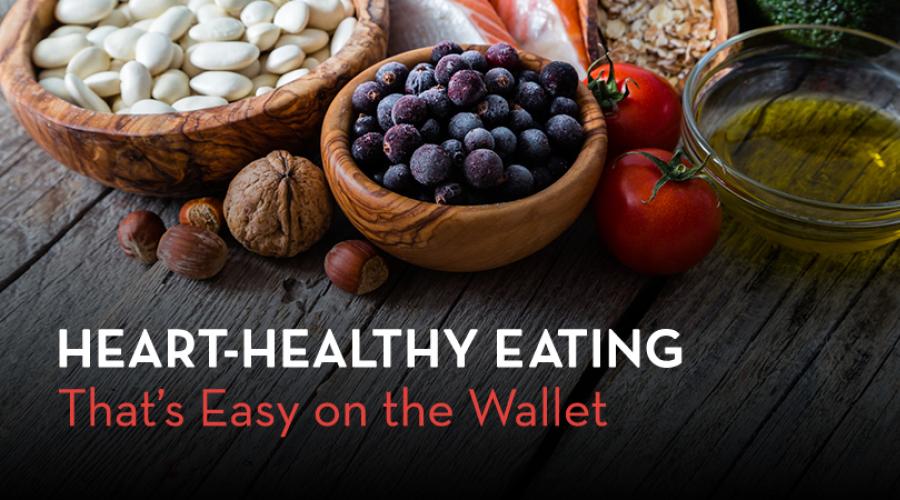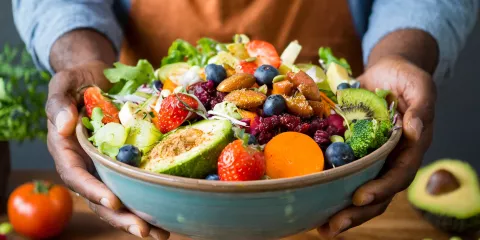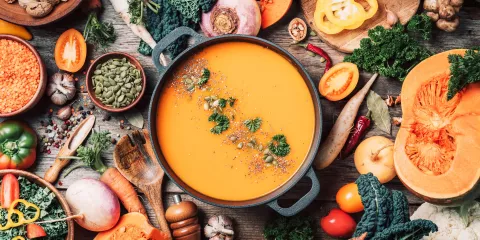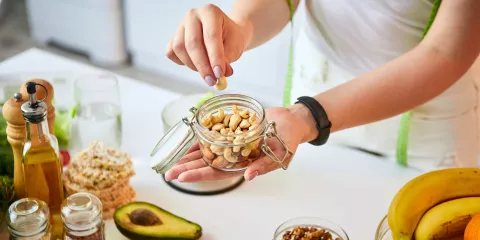
Heart-healthy eating has gotten a bad reputation for being expensive. It doesn’t have to be that way. In fact, you can follow healthy eating habits at a relatively low cost.
This article includes a few good practices for how to eat in ways that are good to your heart and friendly to your bank account.
Choose Affordable Lean Protein
A typical 50 year old woman needs about 50 grams of protein each day. You can use this calculator to estimate how much protein you need.
Lentils and beans are among the most affordable superfood at any market. They're loaded with essential minerals plus fiber that can help stop you from overeating.
Choosing lean protein (e.g., fish, legumes) instead of a fat-marbled steak may lower your risk for heart disease, high cholesterol, stroke, heart attack and more.
Here are three affordable ways to get your fill of lean protein.
Legumes: At about a dollar per pound, lentils and beans are among the most affordable superfood at any market. They give you essential minerals (iron, potassium, magnesium, copper and zinc) along with fiber that fills you up and helps stop you from overeating.
Boneless, Skinless Poultry: Try to purchase your poultry at off-peak shopping hours, or right after the weekend, when your grocery store is likely to put meats on discount. If you find a great sale, buy plenty and freeze what you can’t use before the “sell by” date. Remove visible fat and enjoy your meal.
Seafood: Eating a few servings of fish each week is a nutritious and affordable way to support your heart. Seafood options such as rainbow trout, flounder/sole and chunk light tuna are packed with protein, fairly low in mercury and deliver a heart-healthy dose of omega-3 fatty acids. These fats may reduce blood triglycerides and provide other important heart health benefits.
Consider limiting yourself to two cans of chunk light tuna each week.
Shop for Seasonality and Storage for Produce
Produce that is in-season is the best option for your heart and your wallet. Check grocery fliers for seasonal fruit and vegetables that are on sale. You may also visit your local ethnic grocery store or farmer’s market for good prices on produce.
When shopping in a grocery store, go at off hours such as on your way home from work. Fresh produce that has to be eaten or frozen that day is sometimes available at a discount.
In-season produce is the best option for your heart and your wallet. Buy different colors to increase the amount and variety of vitamins, minerals and other plant compounds that promote good health.
Try to buy different colors of fruits and vegetables. This tends to increase the amount and variety of vitamins, minerals and other plant compounds that promote good health.
I’m especially fond of leafy greens (e.g., spinach, kale) because they may help protect against inflammation and other health problems.
Keep in mind that some vegetables actually provide special health benefits when they’re cooked. Marinara sauce, for instance, has more lycopene – good for the heart – than fresh salsa because the marinara contains cooked tomatoes.
Consider a dollar store for canned or frozen vegetables sold at a great price. When buying canned veggies, look for the versions with no added sodium – something you should watch for in all preserved foods.
Buy Bulk Whole Grains
Two holy grails of heart-healthy carbs are brown rice and steel-cut oats. Both can be purchased for just pennies per serving.
Brown rice contains filling fiber and antioxidants to support a healthy heart. Oats also pack tons of fiber and can be cooked easily overnight. You can flavor oats with antioxidant-rich berries and cinnamon.
For a snack, try popping raw corn kernels on the stovetop. You can make a fun, fiber-rich, natural snack by adding your own toppings. Choose olive oil instead of butter for a heart-friendly fat. Sprinkle with spices, but go easy on the salt.
Some affordable vegetables, such as tomatoes, provide special heart health benefits when they're cooked.
Finally, though it’s not a grain, potatoes are a carb worth storing year-round.
Pound for pound,regular potatoes are the most affordable source of potassium. Potassium acts as a natural foil to sodium and may help reduce blood pressure. Sweet potatoes, also full of potassium, are a great source of B6 vitamins and many other nutrients.
Drink Responsibly
Water is both the most affordable and healthiest drink option for healthy circulation. Consider adding the juice of a lemon to give it some extra flavor.
Many studies have suggested drinking green tea may naturally lower cholesterol and triglycerides.
You can get a great deal on green tea by purchasing it in bulk. Serve it either hot or cold, but avoid artificial and sugar sweeteners. They simply increase the price of your heart-healthy beverage without adding any nutritional value.
Milk is a nutritious drink option that can be friendly to your heart when you choose the reduced fat or skim options. Those versions have fewer calories and less saturated fat – and are usually cheaper – than whole milk.
Grocery stores often sell a store brand of milk that’s just as delicious as but less expensive than a brand name competitor, and some sell milk in two gallon packs for an extra discount.
Buy the milk jug with the longest expiration date, which tends to be in the very back of the dairy case, so you waste less.












